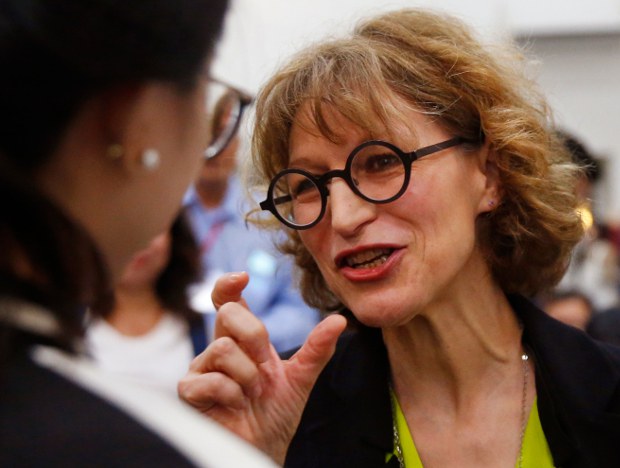Philippines: Special Rapporteur Cannot Take Part in UN Probe Into Drug Killings
2018.02.27
Manila
 Agnes Callamard, the U.N. special rapporteur on extrajudicial executions, talks to a reporter after giving a speech at a drug policy forum at the University of the Philippines in Quezon city, May 5, 2017.
Agnes Callamard, the U.N. special rapporteur on extrajudicial executions, talks to a reporter after giving a speech at a drug policy forum at the University of the Philippines in Quezon city, May 5, 2017.
The Philippines said Tuesday that the United Nations was welcome to investigate thousands of killings under President Rodrigo Duterte’s war on drugs, but special rapporteur Agnes Callamard should not be involved.
Callamard, the U.N.’s special rapporteur on extrajudicial killings, had already prejudged the country’s case, presidential spokesman Harry Roque said.
“As I said, the effectivity of a special rapporteur depends on their character, their credibility, their trustworthiness,” Roque said in a statement.
Roque said U.N. investigators must be “trustworthy enough” so that member-states would consent to their visit, but that Callamard lacked this.
“The fact that there is no way that Agnes Callamard can be allowed to investigate in the Philippines proves that she has failed in this regard,” Roque noted, adding that Callmard’s unannounced visit to Manila last year to attend an academic conference was an “act of bad faith.”
“As I said before, it’s her fault that the home state does not want her in,” Roque said.
Roque, a former human rights lawyer, said that any investigation to be carried out by the U.N. should be agreed to by the state. Under international law, no one can compel any country from agreeing to an investigation, he said.
“If they’re going to send a special rapporteur to the Philippines, it must be someone credible, someone who is an authority in the field that they seek to investigate in, and must be objective and unbiased,” he said.
At least 30 Western countries had earlier called on Manila to allow the U.N. to send an investigator to the Philippines to investigate thousands of killings carried out by police under Duterte’s internationally criticized drug war.
The police said that at least 4,043 suspected narcotics pushers and users had been slain in police operations carried out in the name of the drug war. This figure does not include thousands of others killed by pro-government vigilantes.
Meanwhile, Human Rights Watch and Amnesty International have joined local rights activists in saying that the figure could very well go above 12,000 – a staggering number of deaths considering Duterte has only been in power since July of 2016.
The police and other authorities have said that those killed were suspects who resisted arrest and opted to fight it out in a gun battle, a claim that is widely discredited in the country.
Earlier this month, the International Criminal Court in The Hague began a preliminary probe into a complaint made by a former policeman and a self-described hitman, who claimed that Duterte had ordered many killings when he was the former mayor of the southern city of Davao.
Duterte had said that he welcomed the investigation, while Roque had said he believed it likely would not succeed.
In a report released last week, Amnesty International said it believed that gunmen with links to the police were involved in the extrajudicial killings. It described the widespread killings as “systematic, planned, organized and encouraged by the authorities.”







